Arabidopsis MSI1 is a component of the MEA/FIE Polycomb group complex and required for seed development
- PMID: 12970192
- PMCID: PMC212713
- DOI: 10.1093/emboj/cdg444
Arabidopsis MSI1 is a component of the MEA/FIE Polycomb group complex and required for seed development
Abstract
Seed development in angiosperms initiates after double fertilization, leading to the formation of a diploid embryo and a triploid endosperm. The active repression of precocious initiation of certain aspects of seed development in the absence of fertilization requires the Polycomb group proteins MEDEA (MEA), FERTILIZATION-INDEPENDENT ENDOSPERM (FIE) and FERTILIZATION-INDEPENDENT SEED2. Here we show that the Arabidopsis WD-40 domain protein MSI1 is present together with MEA and FIE in a 600 kDa complex and interacts directly with FIE. Mutant plants heterozygous for msi1 show a seed abortion ratio of 50% with seeds aborting when the mutant allele is maternally inherited, irrespective of a paternal wild-type or mutant MSI1 allele. Further more, msi1 mutant gametophytes initiate endosperm development in the absence of fertilization at a high penetrance. After pollination, only the egg cell becomes fertilized, the central cell starts dividing prior to fertilization, resulting in the formation of seeds containing embryos surrounded by diploid endosperm. Our results establish that MSI1 has an essential function in the correct initiation and progression of seed development.
Figures

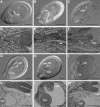
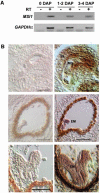
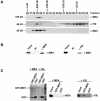
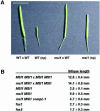

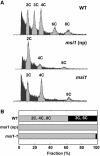
Similar articles
-
The Polycomb group protein MEDEA and the DNA methyltransferase MET1 interact to repress autonomous endosperm development in Arabidopsis.Plant J. 2013 Mar;73(5):776-87. doi: 10.1111/tpj.12070. Epub 2013 Feb 12. Plant J. 2013. PMID: 23146178
-
Identification of new members of Fertilisation Independent Seed Polycomb Group pathway involved in the control of seed development in Arabidopsis thaliana.Development. 2004 Jun;131(12):2971-81. doi: 10.1242/dev.01168. Epub 2004 May 19. Development. 2004. PMID: 15151989
-
Sexual and apomictic seed formation in Hieracium requires the plant polycomb-group gene FERTILIZATION INDEPENDENT ENDOSPERM.Plant Cell. 2008 Sep;20(9):2372-86. doi: 10.1105/tpc.108.059287. Epub 2008 Sep 23. Plant Cell. 2008. PMID: 18812497 Free PMC article.
-
Control of reproduction by Polycomb Group complexes in animals and plants.Int J Dev Biol. 2005;49(5-6):707-16. doi: 10.1387/ijdb.051990ag. Int J Dev Biol. 2005. PMID: 16096976 Review.
-
[Genomic imprinting and seed development].Yi Chuan. 2005 Jul;27(4):665-70. Yi Chuan. 2005. PMID: 16120596 Review. Chinese.
Cited by
-
Genetic regulation of embryonic pattern formation.Plant Cell. 2004;16 Suppl(Suppl):S190-202. doi: 10.1105/tpc.016014. Epub 2004 Apr 20. Plant Cell. 2004. PMID: 15100395 Free PMC article. Review. No abstract available.
-
Dynamic regulatory interactions of Polycomb group genes: MEDEA autoregulation is required for imprinted gene expression in Arabidopsis.Genes Dev. 2006 May 1;20(9):1081-6. doi: 10.1101/gad.378106. Genes Dev. 2006. PMID: 16651654 Free PMC article.
-
Histone Deacetylase Complex 1 and histone 1 epigenetically moderate stress responsiveness of Arabidopsis thaliana seedlings.New Phytol. 2024 Jan;241(1):166-179. doi: 10.1111/nph.19165. Epub 2023 Aug 10. New Phytol. 2024. PMID: 37565540 Free PMC article.
-
The identification of type I MADS box genes as the upstream activators of an endosperm-specific invertase inhibitor in Arabidopsis.BMC Plant Biol. 2022 Jan 6;22(1):18. doi: 10.1186/s12870-021-03399-3. BMC Plant Biol. 2022. PMID: 34991468 Free PMC article.
-
AGL61 interacts with AGL80 and is required for central cell development in Arabidopsis.Plant Physiol. 2008 Sep;148(1):259-68. doi: 10.1104/pp.108.119404. Epub 2008 Jul 3. Plant Physiol. 2008. PMID: 18599653 Free PMC article.
References
-
- Azpiroz-Leehan R. and Feldmann,K.A. (1997) T-DNA insertion mutagenesis in Arabidopsis: going back and forth. Trends Genet., 13, 152–156. - PubMed
-
- Berger F. (1999) Endosperm development. Curr. Opin. Plant Biol., 2, 28–32. - PubMed
-
- Berger F. (2003) Endosperm: the crossroad of seed development. Curr. Opin. Plant Biol., 6, 42–50. - PubMed
Publication types
MeSH terms
Substances
LinkOut - more resources
Full Text Sources
Other Literature Sources
Molecular Biology Databases

